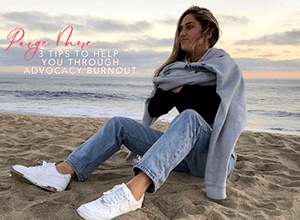
On January 17th, 2017, with trembling fingers and a racing mind, I shared my first-ever Instagram post.
Little did I know this would be the beginning of my advocacy.
At the time, I thought I was simply posting for my youngest sister. You see, she hasn’t been tested for the BRCA 1 variant yet and while I pray she tests negative one day, if she does end up being positive, I wanted to make sure she had empowering photos to look at and a realistic look into what recovery looked like if she too decides to have a preventative mastectomy. Everything I shared, I shared for her.
I didn’t expect others to find this account, to create an incredible community of Breasties, and eventually become a community leader and advocate.
I am so glad I did.
Over the past 5 years, I have been able to connect with Breasties from all around the world. I have hosted free meet-ups in Australia, Indonesia, London, and all across the United States. I have been able to combat pinkwashing, advocate within large corporations for change within their campaigns and advertisements, shared my story on national news outlets like GMA, Women’s Health and People Magazine, co-founded a nonprofit organization, become an advocacy consultant, taught community members how to be advocates and even won a public service award!
But something that many don’t realize is that when you have committed your life to being an advocate while constantly having to advocate for yourself, you can get burned out. Really really burned out.
It pains me to admit that this is something I am struggling with right now and actively trying to work through. I have found that it’s easy for me to advocate for my friends and community members. It comes so naturally to stand up for what I know in my heart to be wrong and to call it out when I see it happening to others. But when it comes to advocating for myself, I still struggle. Ironic, right?
Recently, I have had to advocate for myself when it comes to my health. Fighting for MRIs and ultrasounds has been emotionally taxing and a muscle I thought would be much easier to flex. I have also had to stand up for myself and fellow Previvors as we have been the punching bag for some community members who do not believe we have a place in the breast cancer community. I would be lying if I omitted how harmful this has been to my mental health.
Being an advocate, for yourself and for your community, can be both a privilege and a challenge.
Here are some ways in which I have been working through burnout:
SELF CARE:
I think the first thing that comes to mind when we hear self-care is bubble baths and face masks. Those are nice and enjoyable but I am talking about the hard stuff. The real raw side of self-care. I’m talking about speaking with your therapist and working through it. Sitting with your grief and sadness and feeling all.of.the.feels. I am talking about deep journaling, meditations, and being honest with your true thoughts. It’s about working through it, versus trying to push it down or get over it. These past few weeks I have allowed myself to feel my feels and it hasn’t been pleasant. It’s been really hard. I don’t really want to feel it all. I want to push these feelings away. But I know that if I continue to sweep my feelings under the rug, that rug is going to combust.
A few other things that I consider self-care:
- Crying it out! Why does this always feel so good?
- Deep breathing. Slow down and focus on deep breaths. This always helps when I have anxiety.
- Stay in bed! I am not sure if this is the best advice, but I allowed myself to stay in bed all day and watch trash TV. I needed that day to rest and recharge.
- Get outside! Going on a walk, a hike, or even a long drive outside helps me destress.
- Get creative! Painting, drawing, or doing some other creative activity helps me.
- Get moving! Physical activity usually helps me get out of a funk. But I fully recognize it can be hard to want to move your body when you’re deep in the feels. If all you can muster is a walk around the block, that usually is a good first step for me.
- Ask for a hug! This always helps me feel loved and supported. Whether it’s from my partner or one of my friends, a nice big hug or a little hand squeeze helps you feel less alone.
- Watch something funny! When I am in the blues sometimes I will try to watch a comedy and get myself to laugh. It doesn’t always work, but when it does, laughing is medicine for the soul!
ESTABLISHING BOUNDARIES
Having boundaries is one of the best ways to avoid burnout. You and only you can define what these boundaries are for yourself, as they look different for all of us. (I am also not the right person to advise you on boundaries – I don’t have very good ones – but I am working on this!) There isn’t one way of being an advocate, it looks different person to person. If you are an advocate because you dive deep into the community, show up for people that have the same health diagnosis or conditions that you have, and then help make their lives better in some capacity, this may be both energizing and taxing on you. Establishing what your boundaries are will be so helpful before you reach burnout. Do you give out your personal phone number? Are there set hours when you do your advocacy? Do you advocate on weekends? Do you share intimate parts of your life on social media in real-time or once you’ve healed? Set boundaries and stick to them!
TAKING TIME OFF
In case no one has told you this, it is ok to take a break! Something many advocates fall into is the idea that we have to do it all, all of the time. This is just problematic for soo many reasons and just not true. One of the best things we can do is take time away from our advocacy. It’s ok to pass the torch to someone else or just put it down while you take some time to reset and recharge. You will come back refueled and ready to relight that fire! I recently took a week off from advocacy and released all the guilt surrounding taking a break. I have learned over the years that because I am an advocate all year, so I do not have to fall into the pressures of October and doing the most or being a “super advocate” just because it’s breast cancer awareness month. I know I don’t have to remind you that breast cancer impacts our life 24/7 365 days a year, not just 31 days.
Hoping these three tips help even just a little and I am sending all the advocates out there a virtual hug! Always here to chat if you need a Breastie.
